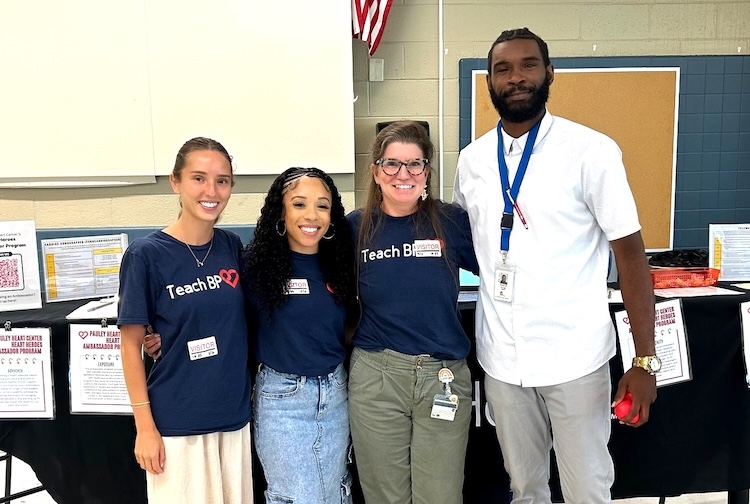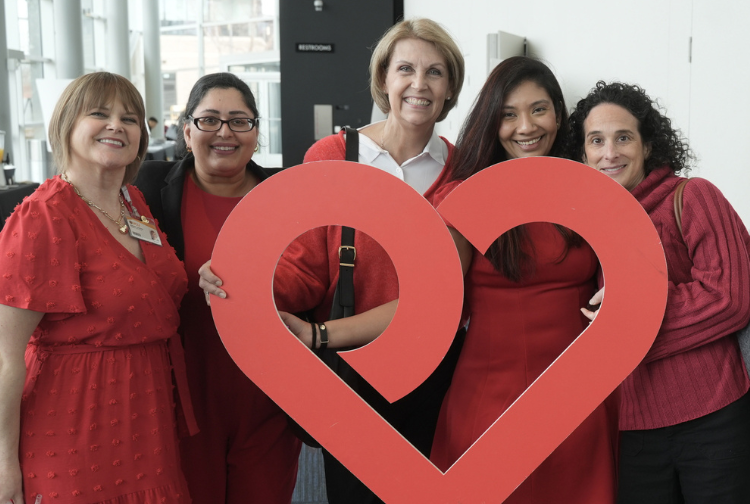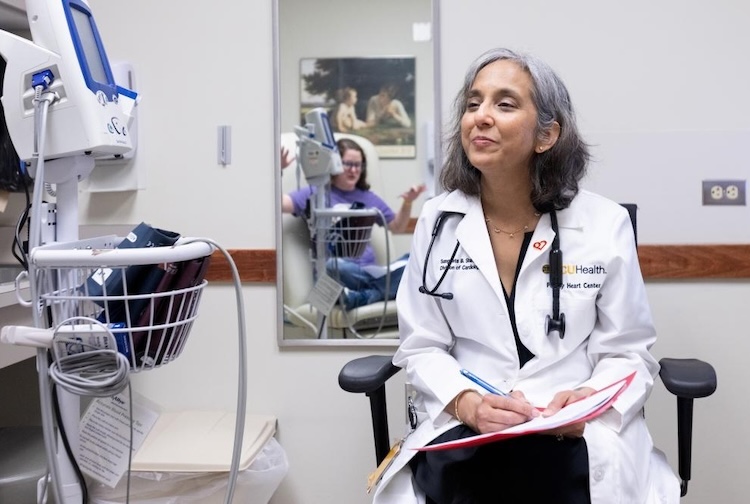Ashland mom says VCU Health’s cardio-oncology team made cancer treatment ‘easy on the heart’
VCU Health Pauley Heart Center is one of two places in Virginia with this unique heart specialty, focused on helping cancer patients with heart disease.
November 19, 2025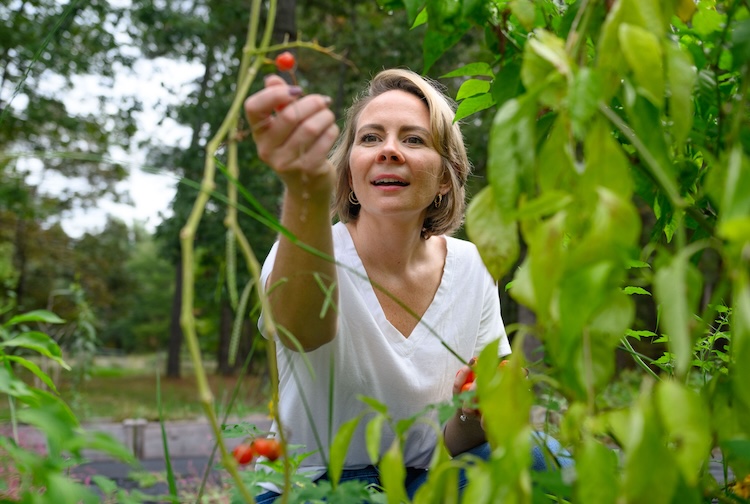 VCU Health patient Samantha "Sam" Edall survived a battle with breast cancer in 2025. She was diagnosed with heart failure as she started cancer treatment. (Jonathan Mehring, Enterprise Marketing and Communications)
VCU Health patient Samantha "Sam" Edall survived a battle with breast cancer in 2025. She was diagnosed with heart failure as she started cancer treatment. (Jonathan Mehring, Enterprise Marketing and Communications)
By Liz Torrey
A diagnosis of heart failure – a chronic and progressive condition in which the heart cannot pump blood effectively enough to meet the body’s needs – can be overwhelming for many patients. 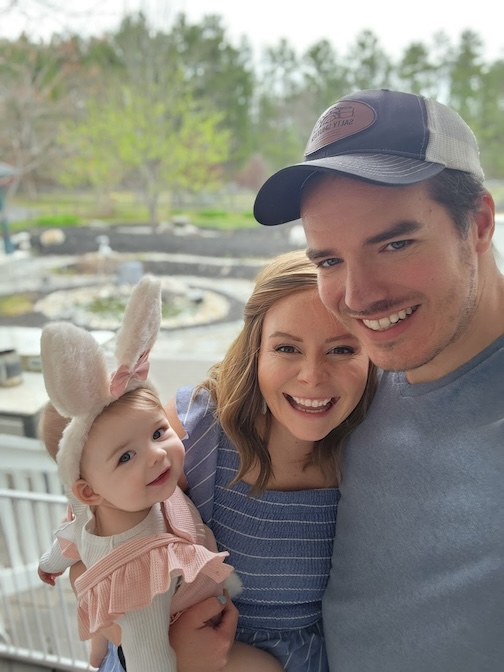 The Edall family was finally getting used to caring for baby Lucy when mom Sam was diagnosed with breast cancer and heart failure. (Contributed photo)
The Edall family was finally getting used to caring for baby Lucy when mom Sam was diagnosed with breast cancer and heart failure. (Contributed photo)
But not for Samantha “Sam” Edall, who was diagnosed with heart failure in late 2023.
“When my cardiologist called [to tell me the news],” she recalled, “it was like, ‘Well, you know, here’s heart failure.’”
Why did Sam respond with a shrug?
Because she had been diagnosed with breast cancer just 24 hours earlier.
Sam was just 34 years old. The week before, she and her husband, Patrick, had purchased a new house, where they hoped to raise their six-month-old baby, Lucy.
And Sam had already been hospitalized for five weeks earlier in that same year due to complications from her daughter’s delivery via c-section.
“It was a cascade of things that just felt unreal,” Sam said. “I had no control over any of it, and I just kept thinking: How much stuff could my mind handle? How much stuff can my body handle? It tested every bit of fortitude that I had.”
Sam’s persistent optimism gave her the strength to get through an incredibly difficult time. And, at each bump in the road, Sam relied on the support of her family, friends, and a comprehensive cardio-oncology team at VCU Health to keep her going.
Cardio-oncology: A ‘game changer’ for cancer patients diagnosed with heart disease
Sam was diagnosed with a type of heart failure called peripartum cardiomyopathy. A racing heart and shortness of breath while at rest are two common symptoms.
The condition was brought on by her pregnancy as well as the stress put on Sam’s body due to complications from the c-section and an extended hospital stay.
Routine follow-up tests for cardiac symptoms she had experienced following surgery – an echocardiogram and stress test – led to the diagnosis. While the stress tests results showed no issues, her cardiologist called once she had reviewed the echocardiogram.
“She said, ‘Sam, you need to come in. You have heart failure. Your heart is functioning at 30%,’” Sam recalled. “Again – this is the day after I was diagnosed with breast cancer.”
We chose therapies that were not only going to make her heart stronger, but also help protect her heart while she was getting cancer treatment and minimize any future risk.
David Chuquin, M.D., cardio-oncologist at VCU Health Pauley Heart Center
Sam was quickly fitted for a heart monitor and a LifeVest – which Sam dubbed her “bomb vest” – that she had to wear at all times except when bathing. In the event of further dangerous cardiac rhythms, the vest would shock her heart “back to life.”
Then, she got to work.
“Once you’ve been diagnosed with cancer, you have one choice, and that’s to actually get the treatment and go through with it,” Sam said. “So that’s what I did.”
When Sam began to search for where to get cancer treatment, her cardiologist recommended VCU Health because of its cardio-oncology program.
Cardio-oncology is a recently developed subspeciality of cardiology that cares for cancer patients and survivors who also have heart health issues. Cardio-oncology has its roots in the 1970s and 1980s; at that time, physicians were beginning to realize that certain types of cancer therapy can damage the heart. As cancer survival rates have increased, so has the need for cardio-oncologists: The risk of heart disease is elevated in cancer survivors, and many cancer survivors need lifelong cardiac care.
“Oncologists have realized that yes, we [are able] to make our patients have better outcomes, and that they are living longer lives,” said Hetal Vachhani, M.D., a hematologist-oncologist at the VCU Massey Comprehensive Cancer Center who was part of the Cancer Service Line (CSL) team at Massey that treated Sam. “But the medicines [we use] also cause cardiotoxicity in the long run, and we are endangering some of their organ function.”
Watch Samantha Edall's story of Unbelievable Joy. (Taylor MacKillop and Robin McLeod, Enterprise Marketing and Communications)
VCU Health’s cardio-oncology program was founded in 2013 by Michael Hess, M.D., who came out of retirement to establish the program after being diagnosed with cancer.
“Dr. Hess started Pauley’s cardio-oncology program by literally walking around the hematology and oncology wards and asking, ‘Do you need help?’” said David Chuquin, M.D., Sam’s cardio-oncologist from VCU Health Pauley Heart Center. “We’ve taken that spirit of collaboration forward. I am in constant communication with the hematology-oncology teams at Massey, [and we work] together to come up with the best plan of treatment for our patients. I really think we are one of the best cardio-oncology programs in the country, and certainly on the East Coast.”
Pauley’s cardio-oncology program is one of only two in Virginia and the only program recognized as a Gold-Certified Center of Excellence by the International Cardio-Oncology Society between Philadelphia and Charlotte.
“The cardio-oncology team at Pauley has been a game changer for patients like Sam,” Vachhani said. “They can have a cardiologist who knows their heart physiology, who understands the management of cardiac disorders, but they can view all of this with the filter of what’s going on with their cancer.”
A multidisciplinary approach to treating cancer patients’ hearts
In Sam’s case, her heart disease wasn’t brought on by her cancer treatment; rather, she needed additional, complex cardiac monitoring and support during cancer treatment due to her preexisting heart disease.
“My goal was to allow this young mom to have access to the best possible cancer therapies,” Chuquin said. “If someone has preexisting heart problems [when they are diagnosed with cancer], sometimes doors to certain types of cancer therapy begin to close. So, the goal was: what can we do to get Sam’s heart in good shape within a very, very short amount of time?”
Chuquin started Samantha on a medication regimen that took her heart from severely weak to completely strong in a matter of months.
“We chose therapies that were not only going to make her heart stronger, but also help protect her heart while she was getting cancer treatment and minimize any future risk,” Chuquin explained.
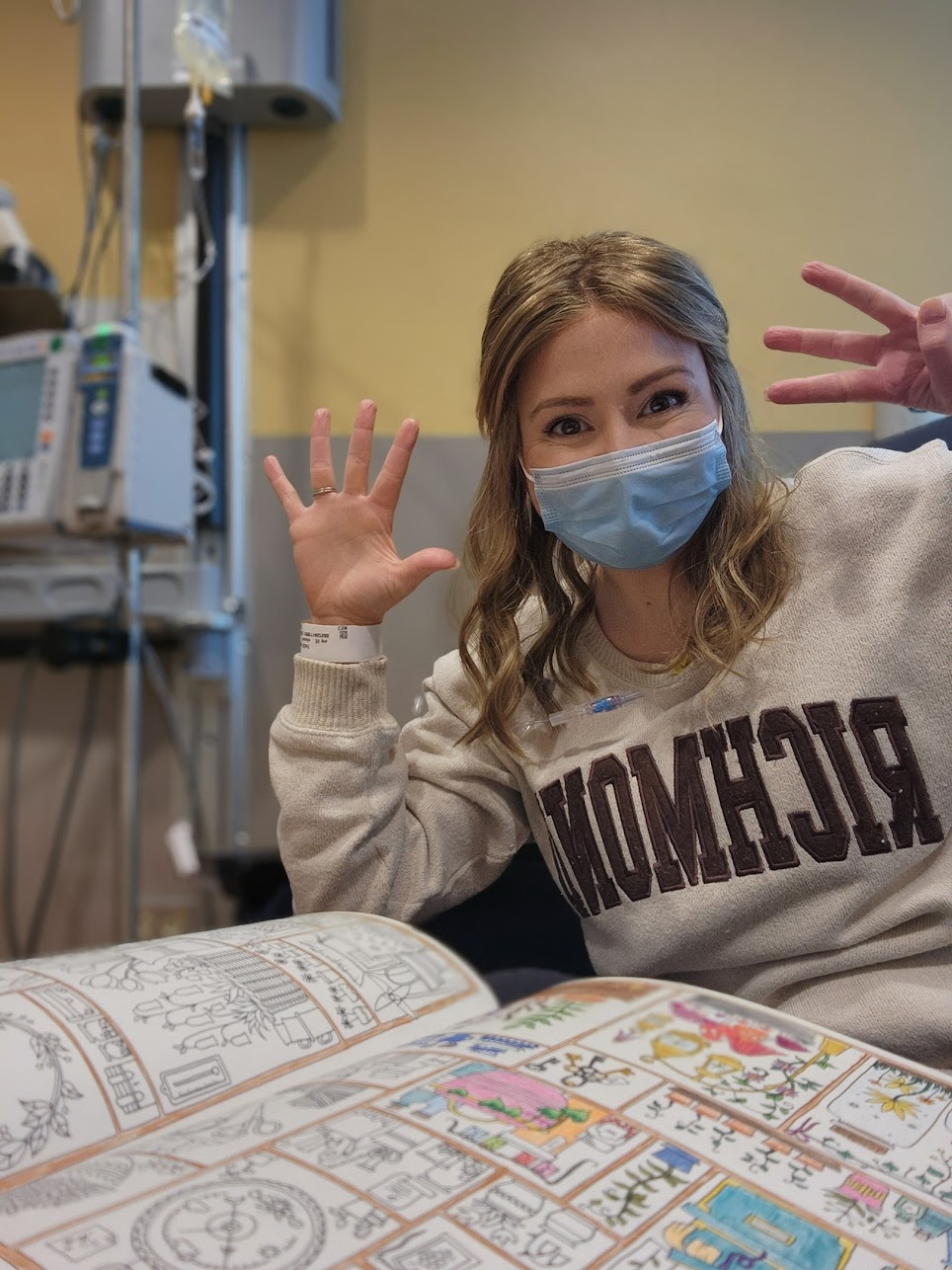 The close collaboration between the heart failure and breast cancer care teams ensured Sam’s heart was healing while she went through rigorous rounds of chemotherapy and radiation treatment. (Contributed photo)For her cancer treatment, Sam had 20 rounds of chemotherapy, about half of which were an older type of chemotherapy that is less commonly used today because it requires a greater number of doses to be effective, but that is also less cardio-toxic than other types of chemotherapy.
The close collaboration between the heart failure and breast cancer care teams ensured Sam’s heart was healing while she went through rigorous rounds of chemotherapy and radiation treatment. (Contributed photo)For her cancer treatment, Sam had 20 rounds of chemotherapy, about half of which were an older type of chemotherapy that is less commonly used today because it requires a greater number of doses to be effective, but that is also less cardio-toxic than other types of chemotherapy.
“We actually ended up giving Sam a pretty standard chemotherapy regimen, because the cardio-oncology team was very convinced that her heart problem was getting better,” said Kandace McGuire, M.D., chief of breast surgery and the interim chief of the cancer service line at VCU Massey Comprehensive Cancer Center. “If we had not had that input, we probably would have pulled our punches and used less chemo, which would have affected her cancer outcome.”
After chemotherapy was complete, Sam had a double mastectomy with reconstruction, followed by 33 treatments of radiation to treat any cancer that had spread to her lymph nodes that could not be removed during surgery.
“It was scary to have to go through surgery after what [I had experienced] with my initial surgery,” Sam said. “But the medications Dr. Chuquin put me on protected my heart all through chemo and radiation and the surgeries, too.”
Today, Sam’s cancer is in complete remission and she is no longer in heart failure. She takes multiple medications designed to prevent the recurrence of her cancer, some of which may also impact her heart health in the long term.
“Because the risk of heart disease is higher in cancer patients, we do hold on to our patients and follow them lifelong,” Chuquin said. “It’s been really great to get Samantha through this period in her life. But now my goal is to make sure her heart remains strong, so she’s able to take care of her kid, and able to all the things that she wants to do, for the rest of her life.”
Sam receives additional heart health monitoring through her enrollment in a clinical trial at VCU – the CROWN Study – that tracks heart health in women following a diagnosis of breast cancer. “By being in this study, I could help future women who are going through this,” Sam said. “It may be a small thing, but it’s something.”
'What sets VCU Health apart is the heart and mission-minded attitude’
To say Sam’s medical journey has been complex would be an understatement. But it’s exactly this kind of medical complexity that VCU Health was built to handle – and heal.
“I had other appointments at different cancer centers, and I just felt that the way they did it at VCU was so comprehensive – especially with having to deal with the heart part of it,” Sam said. “To have my cardiologist in communication with my oncologist, my radiation oncologist, my surgeon, my plastic surgeon – it was so nice to have one system and one group of people that would talk to each other to make sure my treatment plan was easy on my heart.”
It's not just patients who feel supported by the collaborative structure of VCU Health – it’s also the doctors.
“There are plenty of great cardiologists out there that have their own practice and who will see patients with a history of cancer,” Chuquin said. “But we have an exceptional team here, and the only healing we do is cardio-oncology. That allows us to have that extra expertise. There really isn’t any cancer therapy that we’re not able to help risk-stratify and treat.”
“What sets VCU apart is the heart and the mission-minded attitude of every single person,” agreed McGuire. “Everyone is here to take care of the patient. When you pick up the phone and call [a colleague to help], the answer’s always going to be either ‘yes’ or ‘we’ll find a way to make it happen.’ When that is the case, no barrier is insurmountable. No patient is untreatable.”
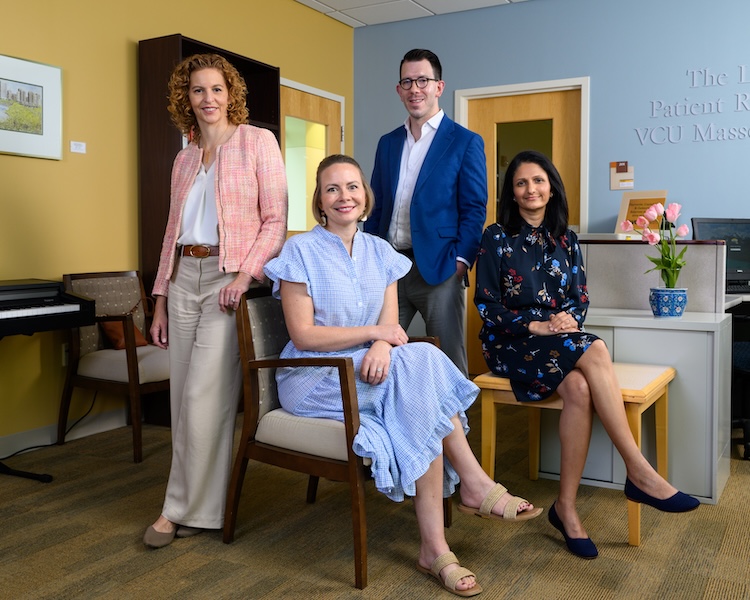 Sam Edall went to VCU Health because of its highly regarded cardio-oncology program at the Pauley Heart Center. Her dedicated team of heart failure and breast cancer specialists included Kandace McGuire, M.D. (left); David Chuquin, M.D. (middle); and Hetal Vachhani, M.D. (right). (Jonathan Mehring, Enterprise Marketing and Communications)
Sam Edall went to VCU Health because of its highly regarded cardio-oncology program at the Pauley Heart Center. Her dedicated team of heart failure and breast cancer specialists included Kandace McGuire, M.D. (left); David Chuquin, M.D. (middle); and Hetal Vachhani, M.D. (right). (Jonathan Mehring, Enterprise Marketing and Communications)
Sam’s journey shows how a connected team can protect the heart while treating cancer, and that no one has to choose between therapies.
For patients facing breast cancer and heart failure, time and coordination matter. The earlier experts intervene, the greater the chance to preserve heart strength and deliver the most effective cancer treatment.
If you or someone you love needs both breast cancer and heart disease treatment, don’t wait to seek specialized care. The experts at VCU Health’s cardio-oncology program are uniquely equipped to manage these intertwined conditions with precision, compassion and innovation.
To keep up with the latest updates from VCU Health, subscribe to the newsletter today.


